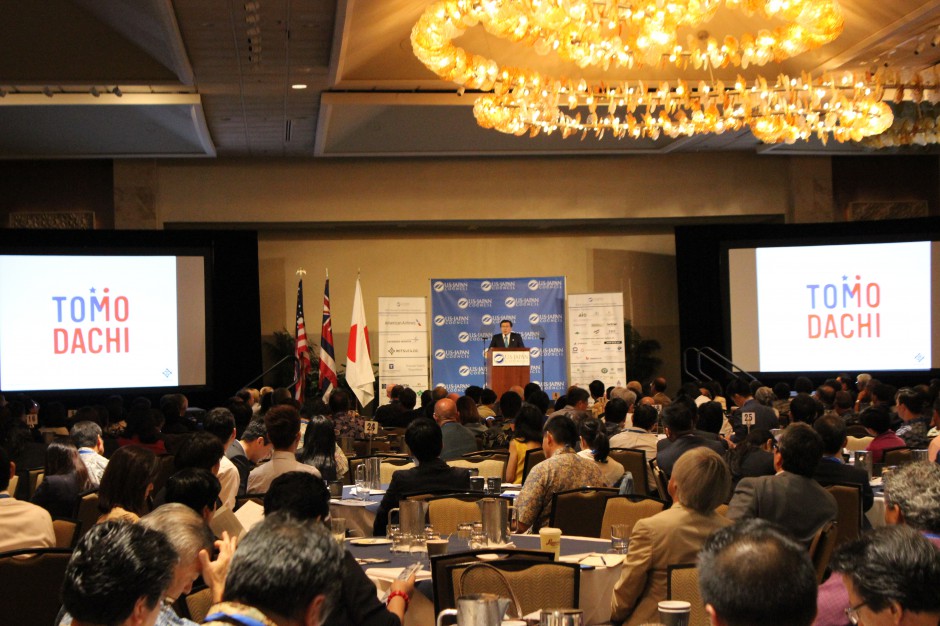
Building Trust through Understanding America’s Diversity
Certainly, there are still quite a few challenges. The Trans-Pacific Partnership negotiations have been rough going, both the U.S. and Japanese governments have been overworked as it is with domestic and foreign issues, and sometimes we are simply at cross-purposes. Despite that — or maybe precisely because of that — both countries must maintain rigorous cooperation and dialogue while advancing our common interests and values. In order to preserve a relationship of trust between our countries, individual human connections are more important than anything else.
Nikkei Who Don’t Seem Like Nikkei
Going forward, what sort of people will maintain the U.S.-Japan relationship? Recently, I attended the annual general meeting of the U.S.-Japan Council — the Japanese-American nongovernmental organization founded by the late Senator Inouye and others — in Honolulu, and I came to realize a few things.
Firstly, there are now nikkei who don’t seem like nikkei.* For example, Commander of the United States Pacific Fleet Admiral Harris — who gave the keynote speech at the general assembly — was born in Yokosuka. His father was a U.S. Navy chief petty officer and his mother Japanese, so he has a Japanese appearance — but with the Southern accent he picked up in his youth, he doesn’t come across as nikkei.
Nikkei tend to be well-educated with a high income level, and marry across race with greater frequency than any other minority group. Among the youngest generation, there are some who look fully Caucasian: Travis Ishikawa, of the World Series-winning San Francisco Giants, and Apolo Ohno, the short track speed skating gold medalist, are some examples of the new nikkei.
It’s not just the nikkei of this new generation who are changing. Congresswoman Tulsi Gabbard of Hawai’i also appeared as a panelist. As a Samoan native, a Hindu, and a female veteran of two campaigns in Iraq, she is a first for Congress in more than one sense. Despite being young for Congress at 33, she is active in both the House Armed Services Committee and Foreign Relations Committee.
The Diverse Leaders of the Next Generation
In the U.S., there are many paths to success. There’s no way of predicting from where a star will appear. However, there is no question that the leaders of the next generation are younger and more diverse than ever before.
For example, consider the individuals President Obama is rumored to be considering for appointment to the Supreme Court. These individuals are among the most prominent U.S. lawyers, and beyond candidates of Caucasian and Jewish descent, there is also a candidate from Hong Kong, one from India, a woman born to Vietnamese refugees, a Chinese candidate, a Korean candidate, and a female Mexican candidate.
This tendency toward diversification can even be seen in the Rhodes Scholar program (a two-year study abroad program at Oxford, chosen from the finest college graduates in the U.S.) and the White House Fellows program (a program which selects individuals from among the citizenry and government to work in the administration for a year), both known as gateways to the elite.
Even in a political landscape where minority peoples are at a disadvantage, there are individuals like Louisiana Governor Bobby Jindal, the son of Indian immigrants; Marco Rubio, the ethnically Cuban senator from Florida; and former President Bush Sr.’s grandson, George P. Bush, who has a Mexican mother: all around the age of 40, all potential presidential candidates.
Further, these days LGBT individuals are gathering considerable political power. The popular actor George Takei was in attendance at the meeting with his husband, and delivered an impassioned speech on gay rights. Wherever you look, the number of publicly gay leaders like Tim Cook, the CEO of Apple, is increasing. As it happens, just last year the Supreme Court ruled same-sex marriage constitutional.
Furthermore, there are a lot of female leaders with military backgrounds like Congresswoman Gabbard. The number of women in managerial/administrative positions has increased as well. Another keynote speaker at the event was the CEO of Lockheed Martin, Ms. Marillyn Hewson.
Making an Intricate Web of Relations
Despite these radically different backgrounds, all these people have one thing in common: They are all proud American citizens. Looking at them with preconceived notions about them belonging to some ethnicity, or being gay, is mistaken.
In this sense, among this diverse set of people, the ones who will become president, the ones who will become members of Congress, the ones who will influence foreign policy or policy toward Japan are things that only God could know. That said, in an America that has already elected a black president, an Indian president or a female Vietnamese member of the Supreme Court should be no cause for surprise.
Americans judge people individually, and show interest in unique histories and idiosyncrasies. From those sentiments arise a positive inclination toward diversification. They take no interest in the “sober and honest” style of staying in continued service to one employer for 30-odd years like in Japan. I wish Japan would also develop a more diverse character. In particular, I wish it of the young generation.
Certainly, nobody could expect Japan, with its different culture and history, to become as diverse as the U.S. There are advantages to homogeneity, as well. But at least we can hold an interest in American society’s diversity, understand it. Make unique and exceptional American friends, not just limited to those of Asian descent. Find some way to get people like that involved in Japan. Create a complex web of trust between people that transcends race.
It’s a bit roundabout, but that’s the path to maintain the U.S.-Japan relationship for the time to come — it’s the way to unite the world, as well.
*Translator’s Note: Nikkei is derived from nikkeijin (日系人), a term for ethnically Japanese individuals without Japanese citizenship/born outside of Japan.

